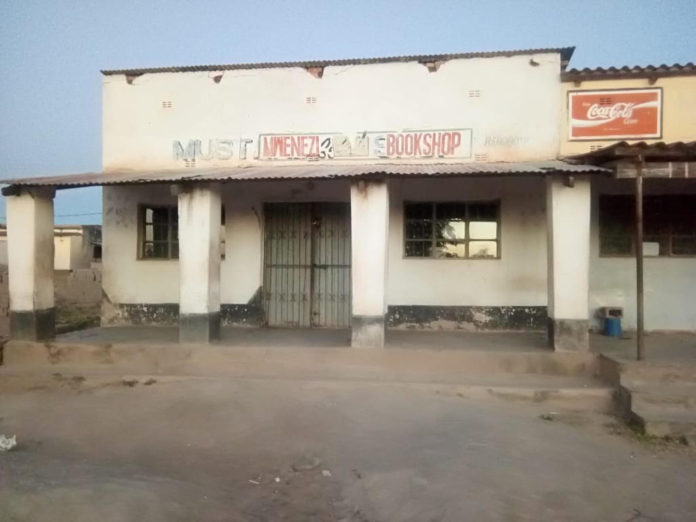Rutenga, June 5 — On a dusty plain, aging shops lie in a file opposite each other, abandoned, with few signs of life around, yet with few impoverished villagers selling trinkets to passing motorists by the roadside.
Rutenga stands out west of Masvingo, Zimbabwe’s oldest town and at this rural township domiciled in the country’s Mwenezi district, several shops have over the years stopped operating, beaten into submission by the country’s marauding economy.
A significant village in Masvingo Province, Rutenga has been commonly dubbed defacto capital of Mwenezi rural district, boasting of a railway station connecting the remote township to Sango border post between Zimbabwe and Mozambique and a local town called Zvishavane.
But, even as the township stands on vantage ground, there is no more life here.
Even 73-year old Hebert Chitova, who used to run one of the grocery shops at Rutenga Township, has not been spared by the life here as the once vivid township rides to extinction.
At Neshuro Township, not far from Rutenga, it is equally another tale of demise as the once-thriving township faces its eventual fall.

For Tobias Mbiriyazvo who has worked as a bartender at one of the properties at Neshuro Township, the remote business center has become a shadow of its former self.
“There is no life at shops here now. What is left is for them to eventually curve in and collapse because there is no more activity taking place under these roofs,” Mbiriyazvo told Ubuntu Times.
Chitova, who has apparently traversed a rugged path to rugs-from-riches, said, ‘the economy over the years left me out of business and this means the township soon may be no more.’
Around 1997, Zimbabwe’s economy started to die away at the parceling out of thousands of dollars compensations to the country’s liberation warfighters, meaning the rural townships were not spared by the economic inferno.
Economists like Denis Chioko based in Masvingo, Zimbabwe’s oldest town, said ‘the 2000 land seizures by Zimbabwe’s war veterans did not bring good news to remote townships that thrived on farmworkers employed by displaced white commercial farmers.’
To Chioko, ‘remote townships lost business as white farmers lost their land because farm laborers who fed into the townships for goods and services were now out of work.’
Zimbabwe’s rural townships are falling apart at a time rural-to-urban migration has been on the rise here, according to development experts.
“Many Zimbabweans have been over the past years flocking to the cities in search of better life, meaning remote townships have been gradually deserted as well, hence the dilapidation,” Agness Msipa, a development expert in Zimbabwe, told Ubuntu Times.

Such is the dilapidation hitting Chachacha Township, a rural shopping center in Shurugwi in Zimbabwe’s Midlands Province.
Although Chachacha township has a 12 km tarred road which was constructed by a Chinese company called China-Gansui, it is riddled with potholes while the buildings have aged and unkempt.
Yet, a few years back Chachacha Township was bigger than some of the small towns neighboring Shurugwi in the Midlands Province before deterioration pounded it owing to Zimbabwe’s economic meltdown.
Neshuro rural township, west of Zimbabwe in Mwenezi district in Masvingo province, has also not been spared by the dereliction pounding remote townships, this despite the township being an administrative center for the district.
Here, several shops have been abandoned and closed although the remote township used to act as one of the largest business centers in Zimbabwe’s drought-prone district.

Further west of Neshuro Township, still in Mwenezi district, is Maranda rural township, also crumbling, but ironically commonly known as Number One.
Number One (Maranda) is a small remote business center on the northern edge of Mwenezi district in this Southern African nation, home to the late popular musician Paul Matavire.
Dotted with crumbling buildings, Maranda rural township however still boasts of being a center of trade in Mwenezi district, with people coming to sell their cattle in week-long trade fairs while the township despite its fading structures also houses a clinic and the government agriculture and water offices.
Also known for being the rendezvous of village clubbers, Maranda Township has over the years been a destination for villagers descending on the business center to dance to sungura music from Zimbabwean singers like Alick Macheso and Khiama Boys.

Sungura is the local genre of the Zimbabwe music industry which became popular in the early 1980s, pioneered by Ephraim Joe and his band Sungura Boys.
But, with the township now falling apart, so is the sungura mania at Maranda Township, according to local traditional leaders in Mwenezi district.
“The township is just dead now; most shops have long ceased to operate and this means our people now find little pleasure at the township,” headman Maranda, told Ubuntu Times on telephone.
Yet, Zimbabwe in 1980 established growth points which helped in the curtailment of rural-urban migration through the decentralization of services to the country’s remote areas, creating employment opportunities for the rural dwellers.

